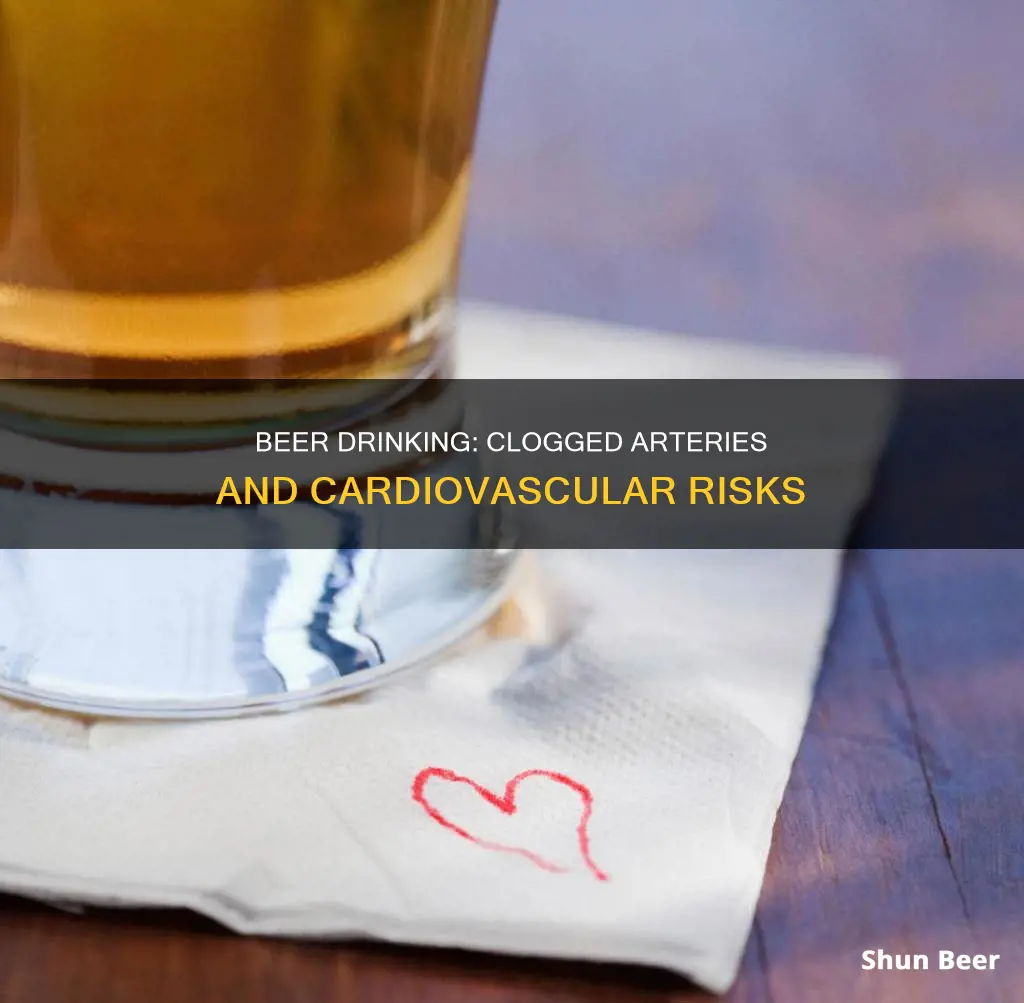
Beer is one of the most popular alcoholic drinks worldwide, and its consumption has been associated with several health benefits, including a reduced risk of heart disease. However, excessive alcohol consumption, including binge drinking, has been linked to an increased risk of cardiovascular issues. So, can drinking beer clog your arteries? This question delves into the complex relationship between alcohol and heart health, exploring the potential benefits and harms of beer consumption on arterial health.
| Characteristics | Values |
|---|---|
| Can drinking beer clog your arteries? | Excessive drinking can lead to a buildup of plaque in the arteries, a condition known as atherosclerosis, which can cause arteries to become partially or completely blocked. |
| Heavy drinking can cause arterial stiffness, especially in men, by interfering with blood flow and affecting the elasticity of the arterial walls. | |
| Moderate drinking (1-2 drinks per day) may have a positive effect on cardiovascular health, but it is not recommended to start drinking for this reason alone. | |
| Binge drinking (more than 3-4 drinks per day for women and more than 4-5 drinks per day for men) can cause irregular heart rhythms and increase the risk of heart disease and stroke. |
What You'll Learn

Binge drinking increases the risk of atherosclerosis
Binge drinking is associated with an increased risk of atherosclerosis, a condition that causes the hardening and narrowing of arteries. Atherosclerosis can lead to heart attacks or strokes.
A Finnish population-based study showed that binge drinking was linked to a higher risk of atherosclerotic progression in middle-aged men. The study found that men who consumed six or more drinks in one sitting experienced greater atherosclerotic progression.
Similarly, a study on mice found that binge drinking—equivalent to seven drinks a day, two days a week—increased the development of atherosclerosis. In contrast, daily moderate drinking—up to two drinks per day—decreased the disease's progression.
Another study found that binge drinking in young and middle-aged individuals was significantly associated with cerebral infarction within 24 hours.
Heavy drinking can cause arterial stiffness, particularly in men, by interfering with blood flow and affecting the elasticity of the arterial walls.
Celiac Conundrum: Is Barley Beer Safe to Drink?
You may want to see also

Heavy drinking can lead to high blood pressure
Drinking beer, or any other alcoholic beverage, can have adverse effects on your cardiovascular health. Excessive alcohol consumption can cause a buildup of plaque in the arteries, a condition known as atherosclerosis. This leads to a partial or complete blockage of the arteries, reducing blood flow and potentially causing a heart attack over time.
Heavy drinking can also lead to high blood pressure, even in adults without hypertension. Research has found a clear association between the number of alcoholic drinks consumed and increases in systolic and diastolic blood pressure. Even low levels of alcohol consumption were associated with detectable increases in blood pressure, which may lead to a higher risk of cardiovascular events. Therefore, limiting alcohol intake is generally advised to maintain healthy blood pressure and reduce the risk of associated health issues.
The American Heart Association recommends no more than two drinks per day for men and one drink per day for women. These guidelines aim to help individuals manage their alcohol consumption and reduce the potential negative impacts on their health. It is important to note that drinking patterns, such as binge drinking, can also influence the impact of alcohol on cardiovascular health. Binge drinking, defined as consuming more than four drinks on any day for men and more than three drinks on any day for women, can be particularly harmful.
The exact mechanisms by which alcohol affects cardiovascular health are still being studied. However, research suggests that heavy drinking can cause arterial stiffness and interfere with blood flow, affecting the elasticity of arterial walls. This can lead to a higher risk of cardiovascular disease, which is the leading cause of death worldwide.
In summary, heavy drinking can lead to high blood pressure and negatively impact cardiovascular health. It is important to drink in moderation, follow recommended guidelines, and be mindful of drinking patterns to minimize potential health risks associated with alcohol consumption.
Beer and Metro North: What's Allowed?
You may want to see also

Excessive alcohol consumption can cause weight gain
Excessive alcohol consumption can lead to weight gain in several ways. Firstly, alcohol is high in calories, with about seven calories per gram, compared to four calories per gram for carbohydrates and protein. These calories are often referred to as "empty calories" as they provide little to no beneficial nutrients or minerals. Alcoholic drinks, especially cocktails and mixed drinks, can contain a high number of these empty calories, which do not contribute to building muscle, repairing tissues, or supporting strong bones.
Secondly, alcohol can interfere with your body's ability to burn fat. When you consume alcohol, your liver prioritizes breaking down alcohol instead of fat. As a result, fat accumulation may occur, especially in the abdominal region, leading to what is commonly known as a "beer belly." This abdominal fat is associated with various health complications.
Thirdly, alcohol can increase your appetite and make you feel hungrier. It has been found to affect the functions of glands that release hormones, particularly those that control appetite, hunger, and stress. For example, heavy drinking may cause elevated levels of cortisol, a stress hormone, leading to increased abdominal weight gain and cravings for high-calorie foods. Alcohol can also lower your blood sugar levels, prompting you to reach for high-carb foods to satisfy your cravings.
Finally, excessive alcohol consumption can disrupt your sleep patterns, leading to sleep deprivation, which, over time, may also contribute to weight gain. People who suffer from insomnia or sleep deprivation tend to eat more and find it harder to resist tempting, unhealthy snacks.
While the relationship between alcohol consumption and weight gain is complex and influenced by various factors, it is clear that excessive drinking can contribute to weight gain and increase the risk of obesity.
Beer and Zantac: Is It Safe to Mix?
You may want to see also

Alcohol can increase the risk of heart failure
Excessive alcohol consumption can have a detrimental effect on heart health. While moderate drinking may be deemed beneficial, heavy drinking can increase the risk of heart failure.
Alcohol and Heart Health
The belief that alcohol, particularly red wine, is good for the heart is widespread. Indeed, some studies have shown an association between moderate alcohol intake and a lower risk of dying from heart disease. However, it is challenging to determine cause and effect from these studies. For example, red wine drinkers may be more likely to eat a heart-healthy diet, and other factors such as income and education could also play a role.
The Impact of Heavy Drinking
Heavy drinking is linked to various adverse health outcomes, including heart conditions. Excessive alcohol intake can lead to high blood pressure, heart failure, and stroke. It can also contribute to cardiomyopathy, a disorder affecting the heart muscle.
Binge Drinking and Arterial Stiffness
Binge drinking, defined as consuming more than four drinks on any day for men and more than three drinks on any day for women, can have particularly harmful effects on the heart. Research has shown that binge drinking can cause arterial stiffness, leading to a significant increase in the risk of cardiovascular disease. Specifically, binge drinking contributes to atherosclerosis, or the hardening and narrowing of arteries, which can ultimately result in a heart attack or stroke.
Alcohol's Impact on Cholesterol
Alcohol can also influence cholesterol levels. While moderate drinking may slightly raise levels of HDL or "good" cholesterol, heavy drinking is associated with increased levels of LDL or "bad" cholesterol. High levels of bad cholesterol further elevate the risk of heart disease.
In conclusion, while moderate drinking may have some potential benefits, heavy drinking can increase the risk of heart failure and other serious health problems. It is important to consume alcohol in moderation and be mindful of its potential negative impact on heart health.
Beer and Optavia: What You Need to Know
You may want to see also

Drinking beer can be beneficial for the heart in moderation
Drinking beer, like any other alcoholic beverage, can be beneficial for the heart when consumed in moderation. However, it is important to note that excessive alcohol consumption can have adverse effects on cardiovascular health.
Moderate drinking is generally defined as one drink per day for women and one to two drinks per day for men. Consuming alcohol within these moderate limits may have a positive impact on cardiovascular health. For example, some studies have shown that moderate alcohol intake can lead to a lower risk of dying from heart disease. Additionally, moderate amounts of alcohol may help slightly raise levels of "good" HDL cholesterol, which can be beneficial for heart health.
Research has also suggested that red wine, in particular, may offer some protective effects for the heart due to its antioxidant content. However, it is important to note that these antioxidants can also be obtained from other food sources such as fruits, vegetables, and grape juice.
While moderate drinking may have some potential benefits, excessive alcohol consumption can lead to serious health issues. Heavy drinking can cause a buildup of plaque in the arteries, a condition known as atherosclerosis, which can lead to heart attacks and strokes. It can also contribute to high blood pressure, heart failure, and cardiomyopathy, a disorder that affects the heart muscle.
Therefore, it is crucial to maintain a healthy relationship with alcohol and drink in moderation to avoid alcohol-related heart issues. Binge drinking, which is defined as excessive alcohol consumption within a short period, should be avoided. Maintaining a balanced and healthy lifestyle that includes exercise and a nutritious diet is essential for maintaining good cardiovascular health.
Beer Consultation: A Guide to the Process
You may want to see also
Frequently asked questions
Excessive alcohol consumption can cause a buildup of plaque in the arteries, a condition known as atherosclerosis. This can lead to arteries becoming partially or completely blocked, reducing blood flow and potentially causing a heart attack over time. However, some studies have shown that moderate drinking may have a positive effect on cardiovascular health.
Excessive alcohol consumption is generally defined as more than 4 drinks in a single day or more than 14 drinks in a week for men. For women, it is typically defined as more than 3 drinks in a single day or more than 7 drinks in a week.
Moderate alcohol consumption is typically defined as 1 drink per day for women and 1-2 drinks per day for men.
Excessive alcohol consumption can lead to high blood pressure, heart failure, stroke, and cardiomyopathy, a disorder that affects the heart muscle. It can also contribute to weight gain and obesity, as well as increase the risk of liver disease, cancer, and peptic ulcers.







